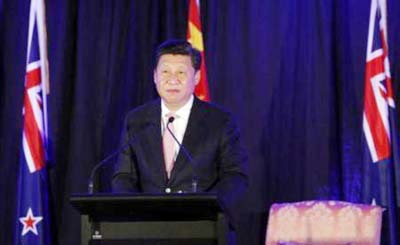
AFP, Beijing :
Chinese President Xi Jinping said in a key foreign policy speech that the rising Asian nation would protect its sovereign territory, the Xinhua news agency reported, as it faces maritime disputes with several neighbours.
“We should firmly uphold China’s territorial sovereignty, maritime rights and interests and national unity,” Xi told a Communist Party meeting on foreign affairs held on Friday and Saturday, according to excerpts of his speech released by Xinhua on Sunday.
Ties between China and Japan have been strained over the past two years after Tokyo nationalised the Senkaku islands-which it already administered-in the East China Sea. Beijing also claims the chain, which it calls the Diaoyu islands.
China and Southeast Asian countries-including Vietnam, Malaysia, the Philippines and Brunei-also have competing claims for the Spratly islands in the South China Sea. Taiwan, which China considers part of its sovereign territory, also has a claim to part of the Spratlys.
Xi, both China’s president and Communist Party secretary, added his country would “properly handle territorial and island disputes” but did not name them.
Relations between China and Japan have improved after Xi and Japan’s Prime Minister Shinzo Abe met on November 10, but Chinese coastguard ships have continued to patrol waters around the disputed islands.
On a more conciliatory note, Xi told officials at the meeting that China sought “peaceful development” and opposed the “wilful use or threat of force”.
The leaders of the United States, Australia and Japan earlier this month called for peaceful resolutions of maritime disputes, after US President Barack Obama warned of the dangers of outright conflict in Asia as China contests disputed territory.
China views the US foreign policy “pivot” to the Asia-Pacific region as an attempt to contain it.
The Chinese leader made no direct reference to the United States in the portions of his speech released by Xinhua, other than saying Beijing should “manage well” relations with other major countries.
“We should fully recognise the uncertainty in China’s neighbouring environment, but we should also realise that the general trend of prosperity and stability in the Asia-Pacific region will not change,” Xi said.
“We have advocated the building of a new type of international relations underpinned by win-win cooperation,” Xi told a meeting of top leaders convened by the Communist Party to discuss foreign policy. China championed “a new vision featuring common, comprehensive, cooperative and sustainable security.”
Xi’s remarks are the latest indication that China is adopting more conciliatory foreign policy tactics and addressing fears its economic growth will inevitably spawn a more muscular diplomatic and military approach.
Chinese President Xi Jinping said in a key foreign policy speech that the rising Asian nation would protect its sovereign territory, the Xinhua news agency reported, as it faces maritime disputes with several neighbours.
“We should firmly uphold China’s territorial sovereignty, maritime rights and interests and national unity,” Xi told a Communist Party meeting on foreign affairs held on Friday and Saturday, according to excerpts of his speech released by Xinhua on Sunday.
Ties between China and Japan have been strained over the past two years after Tokyo nationalised the Senkaku islands-which it already administered-in the East China Sea. Beijing also claims the chain, which it calls the Diaoyu islands.
China and Southeast Asian countries-including Vietnam, Malaysia, the Philippines and Brunei-also have competing claims for the Spratly islands in the South China Sea. Taiwan, which China considers part of its sovereign territory, also has a claim to part of the Spratlys.
Xi, both China’s president and Communist Party secretary, added his country would “properly handle territorial and island disputes” but did not name them.
Relations between China and Japan have improved after Xi and Japan’s Prime Minister Shinzo Abe met on November 10, but Chinese coastguard ships have continued to patrol waters around the disputed islands.
On a more conciliatory note, Xi told officials at the meeting that China sought “peaceful development” and opposed the “wilful use or threat of force”.
The leaders of the United States, Australia and Japan earlier this month called for peaceful resolutions of maritime disputes, after US President Barack Obama warned of the dangers of outright conflict in Asia as China contests disputed territory.
China views the US foreign policy “pivot” to the Asia-Pacific region as an attempt to contain it.
The Chinese leader made no direct reference to the United States in the portions of his speech released by Xinhua, other than saying Beijing should “manage well” relations with other major countries.
“We should fully recognise the uncertainty in China’s neighbouring environment, but we should also realise that the general trend of prosperity and stability in the Asia-Pacific region will not change,” Xi said.
“We have advocated the building of a new type of international relations underpinned by win-win cooperation,” Xi told a meeting of top leaders convened by the Communist Party to discuss foreign policy. China championed “a new vision featuring common, comprehensive, cooperative and sustainable security.”
Xi’s remarks are the latest indication that China is adopting more conciliatory foreign policy tactics and addressing fears its economic growth will inevitably spawn a more muscular diplomatic and military approach.

